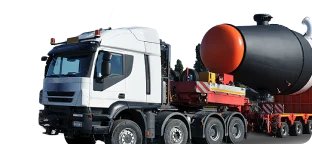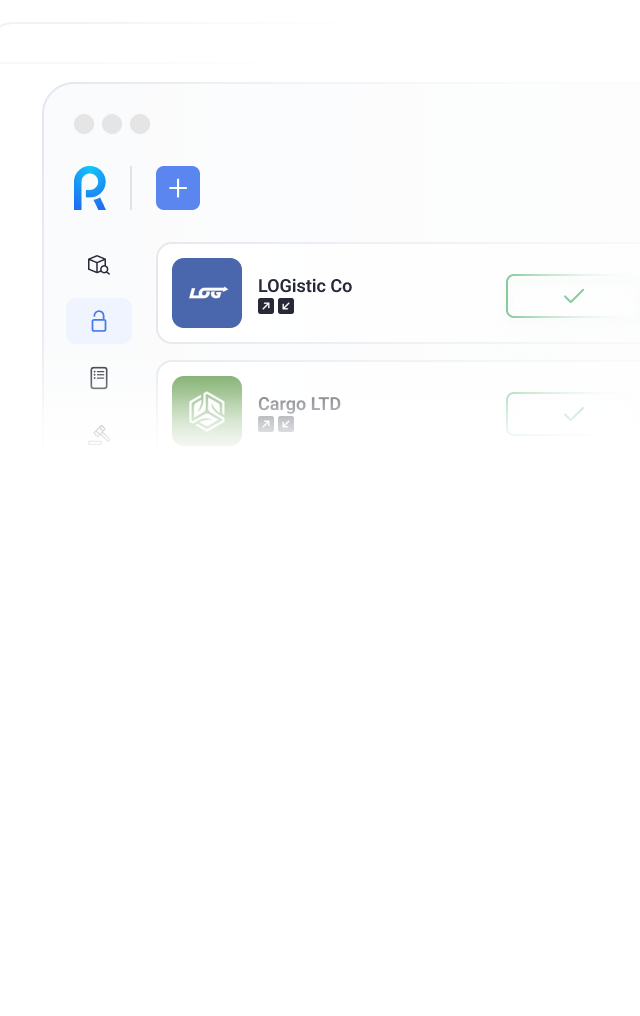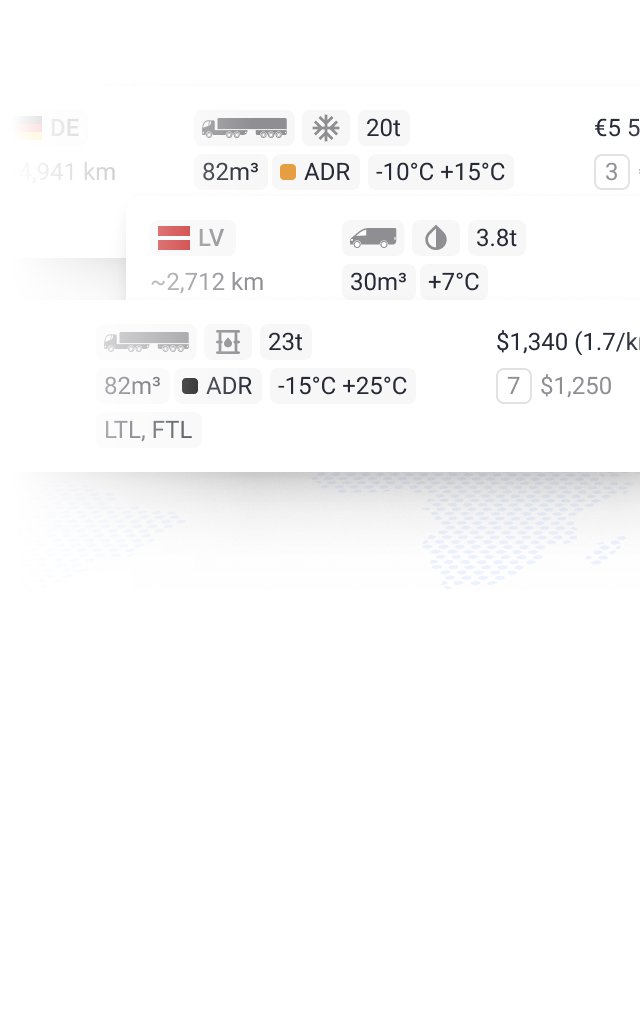
Project Cargo Transportation



















Project cargo refers to objects whose transportation on public roads is prohibited due to the potential risk of damaging power lines, road surfaces, bridge structures, or causing inconvenience to other road users.
Project cargo does not fit into standard classification categories. Project cargo transportation can be organized within a single country or have an international scope. In project logistics, various modes of transport may be used for a single order: road, water, rail, and air.
Specialized logistics solutions are required for delivery due to the following characteristics:
- It is crucial to carefully plan each stage of the journey, ensuring adherence to deadlines and staying within budget.
- The project must be coordinated with road authorities and government agencies.
- There is an objective need to strictly follow a pre-determined route.
- Transporting project cargo requires enhanced safety measures.
- Escort and security services are often necessary.
Project cargo includes oversized, heavy, expensive, and technically complex goods, such as:
- military equipment
- components of production lines for industrial facilities
- complex structures for construction and outfitting drilling rigs
- fragments of space rockets
- large-sized material assets, including power generation units
Such cargoes are typical for the mining industry, energy sector, and construction.
Specialized equipment is used for transporting project cargo, as it is technically capable of handling such complex shipments, with a load capacity ranging from 100 to 200 tons while remaining maneuverable.
Thus, it is clear that selecting transport for project cargo is a challenging task. Ordinary vehicles are not used because their structural strength is not designed for such loads. Any breakdown or emergency during transit could damage the cargo and negatively impact delivery timelines.
In project shipping, equipment specifically designed for project logistics is utilized:
- low-bed trailers
- barges and crane vessels
- pontoons
If project cargo weighs 500 tons, railway transporters are typically employed.
The most optimal transport option for project cargo is considered to be low-bed trailers. They have a structural advantage over other types of specialized equipment, with platform sizes that can extend up to 4 meters in width and 33 meters in length.
Additionally, only trailers are equipped with steerable axles, which allow for precise maneuvering necessary for safe transportation. It is evident that trailers cannot travel on public roads due to the insufficient lane widths, which would disrupt traffic for other vehicles.
In project cargo transportation, the route planning phase is the most critical — not all transport infrastructure is suitable for specialized equipment. Therefore, the proposed route must be approved by the Ministry of Transport, and even minor deviations from it are strictly prohibited without authorization.
To ensure the route is approved and no unexpected issues or schedule disruptions occur during transportation, several factors must be considered during the planning stage:
- What is the permissible load on the road surface for all sections of the planned route?
- Are there any bridges, overpasses, tunnels, or other limiting elements of road infrastructure along the way?
- What vehicle dimensions are required to navigate these sections safely?
- What is the height of overhead power lines? Is it possible to temporarily dismantle them for passage?
- What are the terrain characteristics?
Ideally, the route should be as straightforward as possible. Costs will be lower if there is no need for additional work to reinforce road elements, block traffic, or use multiple modes of transport. Additionally, it is preferable to choose areas with no steep descents, ascents, or sharp turns.
The quality of preparation for project cargo delivery directly impacts its effectiveness. Therefore, none of the preparation stages should be overlooked. In organizing project logistics, the following steps must be taken:
- Create a detailed schedule that accounts for the client's requirements.
- Include time for delivery and coordination of all specifics with government authorities.
- Determine which transport will be used, conduct a thorough inspection, and prepare it for the trip.
- Consider splitting the cargo into separate batches to optimize the process without affecting deadlines.
- Accurately calculate fuel and other consumables, and plan locations along the route where these resources can be replenished.
- Equip the vehicle with real-time tracking devices.
- Plan the location and timing for loading and unloading operations.
- Arrange escort services if necessary.
Preparation can take several months, with the approval stage requiring significant time. It is essential to comply with administrative procedures and coordinate with authorities and relevant services in every town or city along the route.
An important step in organizing the logistics of project cargo is customs clearance, which directly affects the timelines and cost of logistics. One of the key procedures is obtaining a commodity classification ruling.
A classification ruling allows for the assignment of a single customs code to all equipment and its parts intended for a specific project. Instead of clearing each individual component through customs separately, the cargo is delivered to a temporary customs control area. From there, it is removed as needed for installation or operation. This approach significantly saves time and reduces customs clearance costs. However, the procedure generally requires thorough preparation.
Despite the lengthy process and initial high costs, using a classification ruling is justified for large-scale projects, as it minimizes the risk of delays and optimizes customs payments.
Important: Errors in documents such as commercial invoices or export declarations can lead to project delays. Therefore, during the planning phase of project transportation, special attention must be paid to preparing all necessary documentation and adhering to the requirements of the classification ruling.
The cost of project cargo transportation depends on several factors, the main ones being urgency, route characteristics, distance, and type of transport used.
Urgency always implies an increased tariff, so the faster the order needs to be completed, the more expensive it will be. The volume of the cargo also plays a role. It’s not always possible to limit the delivery to a single shipment, and sometimes multiple trips are required.
The need for security and escort services significantly increases the cost. Additional expenses may arise if the route requires reinforcing transportation infrastructure or clearing roads. Furthermore, the specific nature of the cargo itself is taken into account. Valuable and high-cost shipments are generally more expensive to transport.
Logistics is not just about delivering cargo; it is a complex, multi-stage process that demands efficiency, cost-effectiveness, and the safety of the goods until they reach their destination. It’s crucial to carefully choose a company you can trust with this task.
To avoid mistakes, consider the following factors:
- Does the potential contractor have sufficient experience and qualifications to fulfill the order? Moving specialized oversized cargo requires expertise, and a company with no prior experience in such services is unlikely to succeed. Preference should be given to those with years of experience in this field and the ability to demonstrate their track record.
- What resources does the transportation company have, and do they match the complexity of the task? Project cargo transportation cannot be carried out without specialized vehicles and equipment for loading operations. Equally important are modern monitoring technologies. If the company does not use real-time tracking systems, it may not be worth engaging with them.
- Does the carrier possess all legally required permits? To avoid legal issues and delays during transit, ensure that the carrier operates fully in compliance with regulations — having the necessary licenses and certificates is essential.
- What guarantees and insurance conditions are offered? What security measures are in place? This is a priority concern. The level of preparation in this area determines whether the cargo will arrive intact and what compensation will be available in case of damage or missed deadlines.
- How reputable is the transportation company, and what is its scale of operations? The larger the company's scope of activity, the more resources it has for organizing project shipments. This not only expands route options but also simplifies customs clearance and obtaining movement permits.
- How well is communication organized with clients? A logistics company must maintain constant contact with its customers, and having a personal manager is a significant advantage.
- Are the current rates justified by the quality of service? It makes sense to analyze offers from several companies and request detailed cost breakdowns to assess whether the proposed expenses align with the quality of service.
Consider the above factors comprehensively. Choosing a logistics company is an important decision that should be made objectively to avoid unnecessary costs and complications.
A reliable transportation and forwarding company specializing in project cargo delivery can easily be found in the Roolz directory. Add your company, find a trustworthy logistics partner, and conveniently organize freight transportation on the Roolz platform!
What is project cargo?
Project cargo refers to objects whose transportation on public roads is prohibited due to the potential risk of damaging power lines, road surfaces, bridge structures, or causing inconvenience to other road users.
Project cargo does not fit into standard classification categories. Project cargo transportation can be organized within a single country or have an international scope. In project logistics, various modes of transport may be used for a single order: road, water, rail, and air.
Specialized logistics solutions are required for delivery due to the following characteristics:
- It is crucial to carefully plan each stage of the journey, ensuring adherence to deadlines and staying within budget.
- The project must be coordinated with road authorities and government agencies.
- There is an objective need to strictly follow a pre-determined route.
- Transporting project cargo requires enhanced safety measures.
- Escort and security services are often necessary.




Add your company


 en
en fr
fr de
de hi
hi pl
pl es
es tr
tr uk
uk